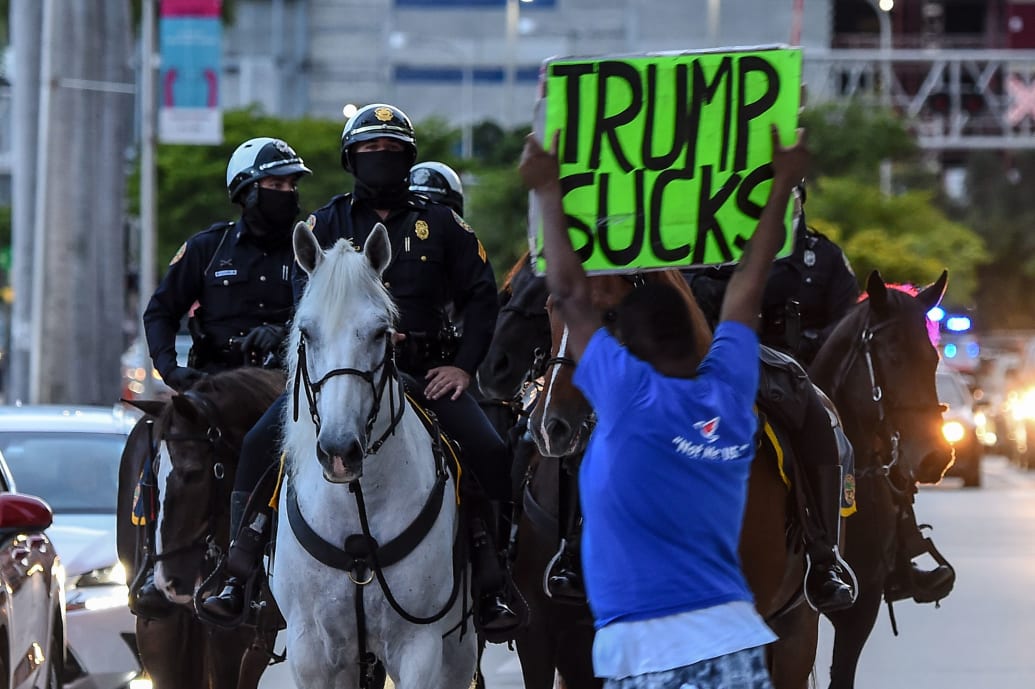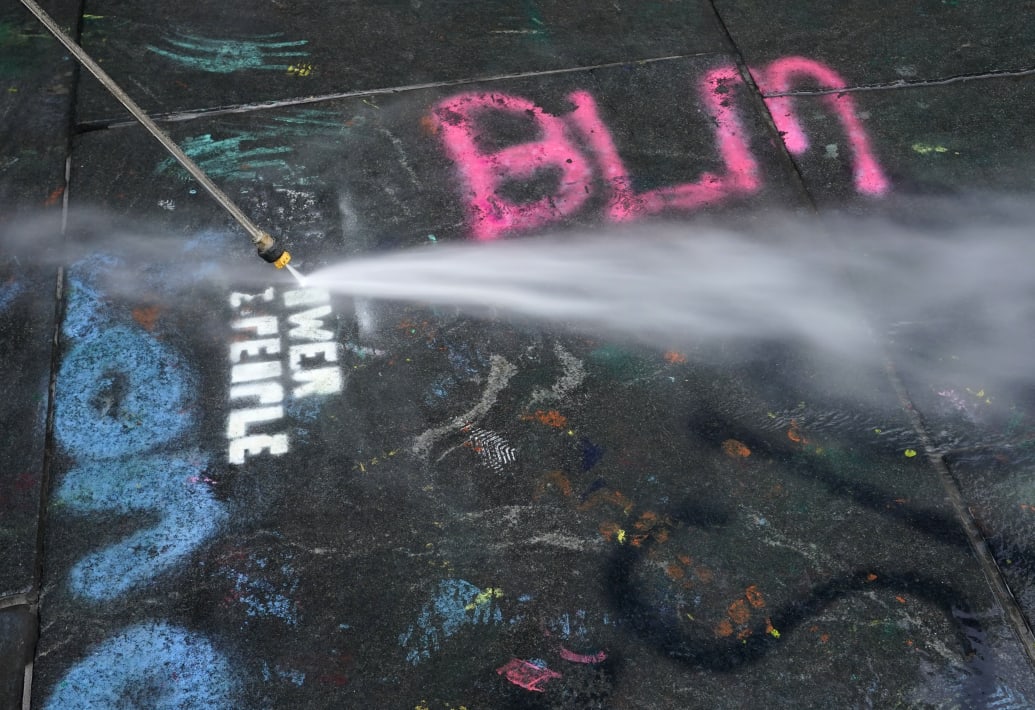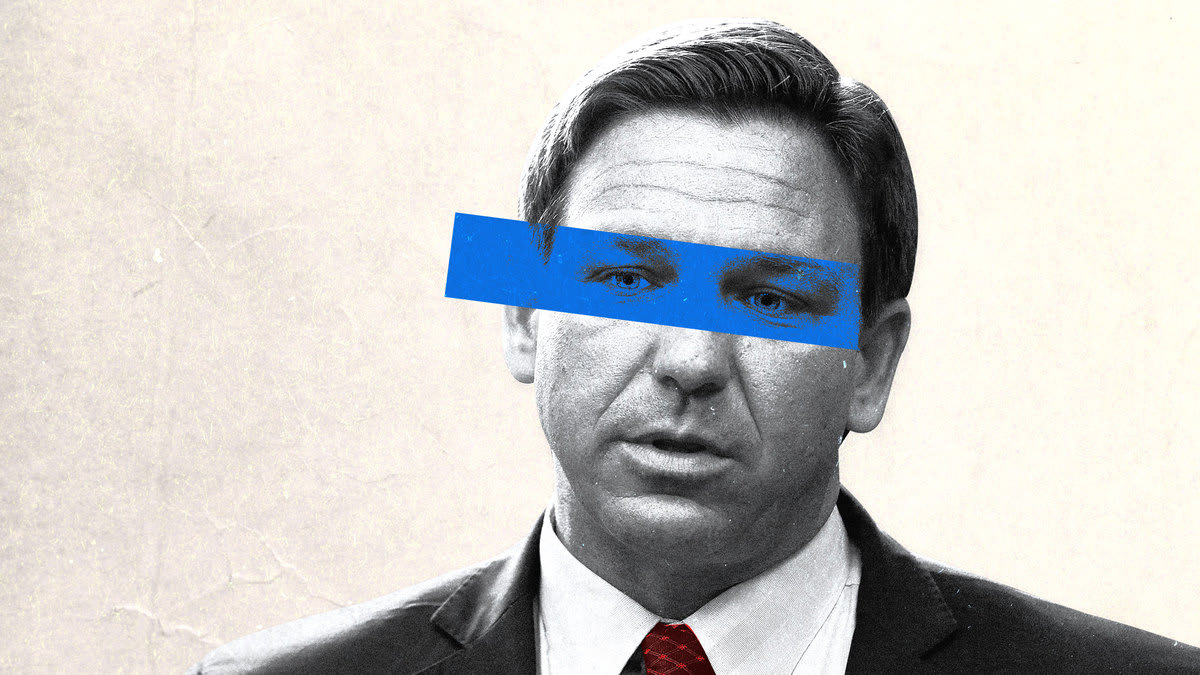Photo Illustration by Kelly Caminero/The Daily Beast/Getty
MIAMI—In August, standing before legions of cops at an event in Indiana organized by the National Fraternal Order of Police, Florida Gov. Ron DeSantis talked up his “law and order” state and took shots at right-wing punching bags like Portland, New York City, and Chicago that made forays into defunding their police departments before backtracking amid rising crime.
DeSantis used the opportunity to pitch what has now become his signature budget item heading into Florida’s 2022 legislative session: pay increases for officers in the state, plus a $5,000 bonus for new cops, including those who might be lured from across America.
“I think the message that we’re sending is that for the folks out there that may be demoralized, and morale may be low, and you’re not getting support in some of these communities, we’re just saying, you know what? We’ve got our little oasis of freedom down in Florida and we respect the rule of law and we respect the people that wear the uniform,” he said.
Heading into 2022, DeSantis has blasted the message far and wide, taking pains to highlight the pro-law-enforcement environment of Florida and bash a defund movement that never had much oxygen in his state. Specifically, the governor has painted the $400 million proposal as a way to keep police happy and, as a result, citizens safe.
But critics of his proposal say the governor—who has become a darling of the right and a rumored 2024 presidential candidate—is simply using a chunk of Florida’s budget to score political points among the right-wing activist set. They also fear his proposal—and in particular calls for officers out of state to find refuge in Florida—could lead to an influx of cops with misconduct issues or who are more focused on culture wars and money than serving the public.
“He cares about whether he’s going to get enough delegates when he runs for president,” Alex Saiz, director of legal services for the Florida Justice Center, a nonprofit legal aid and reentry service agency, said of DeSantis’ proposal.
Saiz placed the legislation in the context of other big initiatives by DeSantis in the recent past, including an anti-rioting bill he pushed through last session despite little unrest in the state during the national protest wave of 2020. He also cited a state Board of Education policy banning critical race theory—despite what Saiz said has been scant evidence the theory is actually being taught in Florida classrooms. (DeSantis has proposed a new law making it easier for parents to sue over such instruction, too.)
“Ron DeSantis wants—whenever someone is scared of a new theory and looks up Defund the Police or Critical Race Theory—to be the first story in that news cycle saying, ‘Look at what this guy is doing,’” Saiz told The Daily Beast. “Whether these policies have actually benefited a person in Florida or not is completely irrelevant.”
Christina Pushsaw, a spokeswoman for DeSantis, did not respond to questions about the governor’s ambitions for higher office in a statement to The Daily Beast. But she pushed back on the idea that DeSantis was intent on bashing the Defund the Police movement purely for political points.
“Florida does not have to experiment with ‘defund the police’ to know it is a disastrous policy that empowers criminals and puts communities at risk,” she said. Pushsaw went on to cite other places in the country that did in fact cut funds from police departments and see increases in crime afterwards, even if the evidence of causation is unclear.
“We do not want Florida to be like San Francisco,” she said. “We do not want carjackings to be as commonplace in Florida as they are in D.C.”
Despite the focus on fighting crime, experts who spoke to The Daily Beast said they weren’t sure DeSantis’ proposal would really make a dent there. They also pointed to ways in which it might backfire badly.
Jeffrey Fagan, a professor and director of Columbia Law School’s Center for Crime, Community and Law, said there is no guarantee a community can “buy more safety” by increasing the size of a police force. “What cops do is more important than how many there are,” he told The Daily Beast.
Fagan added that the extra safety one might secure with the sort of incentives DeSantis is proposing for out-of-state cops could be trivial. Especially when compared to increased costs and risks associated with any increases in police violence or high incarceration rates if the officers attracted to DeSantis’ pitch are less than exemplary.
“DeSantis’ plan is optics, and an attempt to curry political support among cops and other first responders,” Fagan said. “He’s trying to beat Trump to the punch on this.”
Anna Eskamani, a Democratic member of the Florida House of Representatives from Orlando, told The Daily Beast she does agree with DeSantis on the need to provide more funding to public-safety officers in the state—particularly corrections officers. “Politics aside, there is a worthy debate to be had,” she said.
But Eskamani argued that DeSantis’ talking points about the bill seem to be focused less on Florida cops and more targeted at aggrieved officers in other states—particularly those she fears might be resistant to reform efforts or have spotty records when it comes to misconduct.
“The fact is he’s not just focused on bonuses and salaries for law enforcement, but he’s also trying to appeal to police officers that might have questionable track records in other states,” she told The Daily Beast. “He’s really trying to give off the impression that even if you break the rules, you can come to the state of Florida.”
Pushsaw, the governor’s spokeswoman, denied this, and said all officers who come to Florida will go through the same background checks as any other hires in the state.
“This line of criticism is essentially an allegation that our state and local law enforcement agencies are incapable of doing their jobs in terms of screening new hires,” she said. “We reject that criticism and see no evidentiary basis for it.”
In September, DeSantis touted his proposal at the police department in Lakeland, a medium-sized city near Orlando. There, he highlighted the department’s efforts to poach a dozen officers from New York during a recent recruiting trip. DeSantis congratulated the department for going after officers who were “not being treated well, were not being supported” and who he said were not getting the “full-throated support” of their communities and elected officials.

Photo by CHANDAN KHANNA/AFP via Getty Images
“We see an opportunity, given how morale is low throughout many parts of our country amongst people in law enforcement, we have an opportunity to capitalize on that here in the state of Florida,” he said.
During the press conference, DeSantis encouraged a new recruit to the Lakeland Police Department, former NYPD officer Matthew Spoto, to speak about why he made the transition to Florida.
Spoto said that, when he met with members of the Lakeland Police Department in New York City during a recruiting trip this past summer, it was “mind-blowing” to hear police in the state could park their police vehicles in front of their homes without fear. “I used to have to lie about what I used to do,” Spoto said, echoing grievances voiced by police unions in recent years. “I used to have to tell people I was like a bartender, because it was almost like I was ashamed to be a law enforcement officer.”
Speaking about why he left the NYPD, Spoto added that he quickly realized after nearly two years on the force that although he wanted to help people, the “tools and the laws that were set in front of me did not allow me to do so.”
Spoto did not respond to a request for comment for this story.
At the same press conference, Lakeland Assistant Police Chief Hans Lehmann spoke about recruiting from the NYPD, and suggested DeSantis’ legislation would be “huge” for agencies in Florida. Lehmann did not respond to a request for comment.
In November, however, the Miami Herald reported that among the new hires Lehmann recruited to Lakeland from New York were a previously fired Walmart security guard and officers who’d failed to disclose disciplinary history at other departments in their applications. Spoto was not among them.
Thomas Kennedy, a member of the Democratic National Committee and a staunch critic of DeSantis in Florida, pointed to the episode as proof departments might not be “sending their best” to Florida. Kennedy also said DeSantis’ legislation seemed more intent on “stoking a culture war issue out of a non-existent problem” instead of addressing real needs of citizens.
Among the culture-war items relevant to cops: vaccine mandates, which DeSantis has adamantly opposed in all walks of life even as many big-city police departments across the country work to implement them. When asked about the governor’s stance on mandates for cops, Pushsaw, the DeSantis spokeswoman, told The Daily Beast, “COVID-19 vaccination is a private medical decision, and in Florida, we respect that.”
Shevrin Jones, a Democratic state senator from Broward County in South Florida, told The Daily Beast that while he, too, supports improving the wages of police officers in the state and even welcomes new cops, $400 million is a lot of money. He believes some of it should go to address things like salaries and retention efforts for teachers.
“We should have been looking at the most critical shortage areas and taken that $400 million and making sure we’re making an investment in them,” he told The Daily Beast. (Pushsaw said DeSantis’ new budget invests a “historic” amount of money toward teacher pay, and pointed to $600 million in funding to raise teacher salaries.)
Despite the criticism from some quarters about how DeSantis is spreading around state funds, law enforcement officials in the state who spoke to The Daily Beast welcomed the cash. But they also said they haven’t had a tough go of getting people to sign up to be cops in their jurisdictions, suggesting DeSantis is not exactly riding in to their rescue.
Stephan Dembinksy, public safety director of Daytona Beach Shores and the president of the Florida Police Chiefs Association, said adding new hires to his department was as simple as making a proposal to his city manager, which he said was quickly approved by the city council and led to him fully staffing his agency. “My city was very easy to convince,” he told The Daily Beast.

TIMOTHY A. CLARY/AFP via Getty Images
Lee County Sheriff Carmine Marceno told The Daily Beast his agency of 1,700 was down 121 positions when he was first appointed sheriff in 2018. Today, however, he said his department was fully staffed and currently had a waitlist. “It’s a great issue to have,” he added.
Bobby McCallum, the sheriff of Levy County and president of the Florida Sheriffs Association, said he’s faced challenges in filling 12 vacancies in his department of 170. But he explained that has nothing to do with Levy County officials or voters, who he also described as “pro-law enforcement.” McCallum said a lot of his vacancies boil down to pay, and believes DeSantis’ proposal will help his cause.
“Anything we can do in that particular area helps.”
When asked about the prospect of recruiting “bad apples” to the state through DeSantis’ proposal, the law enforcement officials seemed unconcerned.
“Any application, any applicant we get, we have a pretty extensive background process,” McCallum said. “We want to make sure that we’re not negligently hiring. That’s in any case. That’s not just those that might be driven to come here from these incentives.”
Even with the pushback DeSantis is getting over his new proposal, it is clear to most critics that it will likely fly through the Republican-heavy legislature—just like his proposal aimed at rioting.
Jones, the state senator from Broward, said the bill will likely help DeSantis when it comes to taking a crack at a national office. But he was wary about how it might play out for people living in the state in the interim.
“I get it, I get it. The governor wants to be president,” Jones said. “But he also has a state of 22 million people who need his attention. And you can’t expect to try to ascend higher if you neglect the people who you’ve already committed to.”

